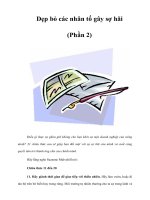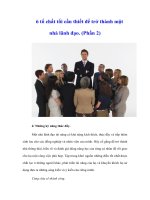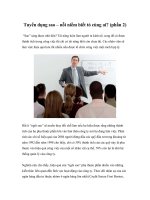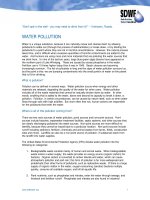DON’T LET THIS HAPPEN TO YOU 2005 phần 2 ppt
Bạn đang xem bản rút gọn của tài liệu. Xem và tải ngay bản đầy đủ của tài liệu tại đây (157.33 KB, 13 trang )
Chapter 1 - Export License Requirements
Introduction
M
any exports of items, including software and technology, require a license from BIS. It is the
responsibility of the exporter to apply for a license when one is required under the EAR. License
requirements for a particular transaction, as described in the EAR, are based on a number of factors,
including technical characteristics of the item to be exported and the item's destination, end-user, and end-use.
When determining whether a license is required for your transaction, you should be able to answer the
following questions:
What is being exported?
Where is the item being exported?
Who will receive the item?
How will the item be used?
If you need assistance to determine whether the item you want to export requires a license you should:
1. Check the BIS Website , or
2. Call one of our export counselors at 202-482-4811 (Washington, DC) or 949-660-0144 (California)
for counseling assistance.
Please note that, whether you are the exporter, freight forwarder, consignee, or other party to the transaction,
you must address any red flags that arise because taking part in an export transaction where a license is required
but not obtained may subject you to criminal or administrative liability. The EAR discuss red flags in a section
entitled "Know Your Customer," Supplement No. Three to Part 732, which is available on the BIS website.
Criminal / Administrative Case Examples
Dr. Thomas Butler
The Violation: On January 14, 2003, Dr. Thomas Campbell Butler, M.D., a professor at Texas Tech
University in Lubbock, Texas reported to the FBI that thirty vials of a potentially deadly plague bacteria,
Yersinia pestis (the causative agent of human plague), were missing and presumed stolen from his research lab.
The report sparked a bio-terrorism alert in west Texas and President Bush was informed of the incident.
However, investigation proved that Dr. Butler had illegally exported the Yersinia pestis which is a controlled
DON’T LET THIS HAPPEN TO YOU!
●
EXPORT ENFORCEMENT
●
CHAPTER 1
7
PREVENTATIVE MEASURES
YOU CAN TAKE
■
Check exporters and customers
■
Check end users and end-uses
■
Review Shipper's Export Declarations
item under the EAR and cannot be exported without the required export
licenses from BIS. On January 15, 2003, Dr. Butler was arrested.
Among the numerous charges of which Dr. Butler was found guilty at
trial, two were export control related: making false, fraudulent and
fictitious statements regarding the exports to federal agents and making an
unauthorized export to Tanzania.
The Penalty: Dr. Butler was convicted of forty-seven counts of a sixty-nine
count indictment that stemmed from BIS's investigation. He was sentenced
to two years in prison on March 10, 2004, and fired from Texas Tech.
Omega Engineering Inc.
The Violation: Omega Engineering Inc., of Stamford, Connecticut and its former Vice President, Ralph
Michel, violated the EAR by exporting certain laboratory equipment to Pakistan in 1997 after BIS had denied
a license for the same shipment earlier that year.
The Penalty: In the criminal cases, Michel was sentenced to ten months imprisonment and fined $50,000,
and Omega was sentenced to a $313,000 criminal penalty and five years corporate probation. In the
administrative cases, Omega agreed to pay a $187,000 penalty and to a five-year denial of export privileges to
Pakistan. BIS also denied Michel's export privileges to Pakistan for five years.
Worldwide Sports & Recreation, Inc. / Bushnell Corporation
The Violation: Between September 1995 and December 1997, Worldwide Sports & Recreation, Inc., which
does business as Bushnell Corporation, exported Night Ranger night vision devices to Japan and fourteen other
countries, without the required BIS export licenses. Bushnell sold the
cameras to a Japanese company but transferred the cameras to a U.S.
company in Florida knowing that the cameras were going to be exported
to Japan. The foreign company and the domestic intermediary pleaded
guilty and cooperated.
The Penalty: In the criminal case, Bushnell was sentenced to a $650,000
criminal fine and five years probation. In the related administrative case,
Bushnell agreed to pay an administrative penalty of $223,000 and to a
one-year suspended denial of export privileges.
Honeywell International Inc.
The Violation: Between December 2001 and February 2002, Honeywell exported hydrogen fluoride to
Mexico from Louisiana without the required export licenses from BIS.
The Penalty: Honeywell agreed to pay a $36,000 administrative penalty.
Mitigating Circumstance: Honeywell voluntarily self-disclosed the violations and cooperated fully with
the investigation.
DON’T LET THIS HAPPEN TO YOU!
●
EXPORT ENFORCEMENT
●
CHAPTER 1
8
Dr. Thomas C. Butler
Night Ranger - Night Vision
Xinjian Yi and Yu Yi
The Violation: Between June 1998 and July 1999, Xinjian Yi and Yu Yi
violated the EAR when they conspired to export thermal imaging cameras
from the United States to the People's Republic of China (PRC) without
the required export licenses from BIS. Xinjian Yi also violated the EAR
when he carried the unlicensed cameras with him to the PRC,
constituting an export, and Yu Yi aided and abetted the export of the
thermal imaging cameras by acquiring them for Xinjian Yi in the United
States.
The Penalty: The parties were each ordered to pay a $22,000
administrative penalty, and denied export privileges for ten years.
Silicon Graphics, Inc. (SGI)
The Violation: In 1996, SGI knowingly exported Challenge L computer systems, upgrades, and peripheral
equipment to the All-Russian Institute for Technical Physics (Chelyabinsk-70) without the required export
license from BIS. Additionally, SGI re-exported computers from its facility in Switzerland to the United
Arab Emirates without the required licenses and failed to notify BIS of certain computer exports as required
by the EAR.
The Penalty: In the criminal case, SGI pled guilty to two felony charges and was sentenced to $1 million in
criminal fines. In the related administrative case, SGI agreed to pay a $182,000 administrative penalty. SGI's
exporting privileges to Russia were denied for a period of three years. The denial of export privileges was
suspended. SGI also agreed, for a period of three years, not to exercise its eligibility to use License Exception
CTP for exports and re-exports to Russia, or to engage in any activity such as the repair or maintenance of
computers involving any military or nuclear end-user or end-use in Russia without the prior written consent
of BIS. Finally, SGI agreed to report to BIS, within 45 days, all of its exports to certain countries of concern
during the prior six months.
Midway Arms Inc.
The Violation: Between April 1999 and July 2001, Midway Arms, Inc. exported firearm scopes and mounts
to Canada without the required export licenses. Midway also exported firearm scopes and mounts to
Argentina, Barbados, Bolivia, Brazil, Finland, Mexico, the Philippines, South Africa, Sweden, Switzerland, and
Uruguay without the required export licenses between May 1999 and September 2002.
The Penalty: Midway agreed to pay a $222,000 administrative penalty, of which $88,800 was suspended for
a period of one year and thereafter waived.
Morton International, Inc.
The Violation: Between 1999 and 2001 Morton International, Inc. exported and attempted to export
thiodiglycol to Mexico and organo-inorganic compounds to Singapore and Taiwan without the required export
licenses from BIS. Between 1997 and 2000, Morton International, Inc. affiliates Morton International, S.A.S.
and Rohm and Haas Japan re-exported organo-inorganic compounds to Israel, Poland, Tunisia, Taiwan and
India without the required export licenses from BIS.
DON’T LET THIS HAPPEN TO YOU!
●
EXPORT ENFORCEMENT
●
CHAPTER 1
9
Thermal Imaging Camera
The Penalty: Morton and its affiliates agreed to pay a $647,500 administrative penalty.
Mitigating Circumstance: Morton International, Inc. voluntarily disclosed the violations relating to the
shipments of organo-inorganic compounds to BIS and cooperated with the investigation.
Roper Scientific, Inc.
The Violation: Between March 13, 2000 and August 24, 2000, Roper Scientific, Inc. knowingly exported
certain night vision cameras without the required export licenses from BIS. These cameras were exported to
various destinations, including South Korea, Japan, and Italy. Roper also failed to retain certain export control
documents and made false statements on a Shipper's Export Declaration.
The Penalty: Roper agreed to pay a $422,000 administrative penalty.
Mitigating Circumstance: Roper voluntarily self-disclosed the violations and cooperated fully with the
investigation.
Molecular Probes, Inc.
The Violation: Between January 1998 and October 2002, Molecular Probes, Inc. exported conotoxin and
tetrodotoxin without the required export licenses from BIS. Molecular Probes has since been acquired by
Invitrogen Corporation, which agreed to guarantee payment of the administrative penalty.
The Penalty: Molecular agreed to pay a $266,750 administrative penalty.
Mitigating Circumstance: Molecular Probes voluntarily self-disclosed the violations and fully cooperated with
the investigation.
Reliance Steel & Aluminum Company
The Violation: Between February 1999 and May 2002, Reliance Steel & Aluminum Company, acting
through its Bralco Metals division, exported aluminum alloy rods without the required export licenses to the
People's Republic of China, Taiwan, Malaysia, and Singapore. Bralco also submitted false Shipper's Export
Declarations.
The Penalty: Reliance agreed to pay a $95,850 administrative penalty.
W.R. Grace
The Violation: In 1997, W.R. Grace exported the chemical triethanolamine to end-users in Brazil, the
Dominican Republic, Hong Kong, Mexico, the Philippines, Singapore, Thailand, and Venezuela without the
required BIS export licenses.
The Penalty: W.R. Grace agreed to pay a $178,500 administrative penalty.
Mitigating Circumstance: W.R. Grace voluntarily disclosed the violations and cooperated fully in the investigation.
DON’T LET THIS HAPPEN TO YOU!
●
EXPORT ENFORCEMENT
●
CHAPTER 1
10
Hamilton Sundstrand Corporation
The Violation: Between September 1997 and February 2001, Sundstrand exported or re-exported centrifugal
pumps to various end-users in China, Taiwan, Israel, and Saudi Arabia, without the required export licenses.
Sundstrand also made false statements on Shipper's Export Declarations, stating that no export license was
required, when in fact a license was required. Additionally, Sundstrand failed to file Shipper's Export
Declarations as required, and failed to provide certain required information on those Shipper's Export
Declarations that Sundstrand did file.
The Penalty: Hamilton agreed to pay a $171,500 administrative penalty.
Mitigating Circumstance: Sundstrand voluntarily disclosed these violations and cooperated fully in
the investigation.
Flint Hill Resources L.P.
The Violation: Between July 1997 and March 1999, Koch Petroleum violated the EAR by exporting crude
petroleum to Canada without the required export licenses from BIS and failing to file Shipper's Export
Declarations.
The Penalty: Flint Hill, formerly known as Koch Petroleum Group, L.P., agreed to pay a $200,000
administrative penalty.
Mitigating Circumstance: Koch Petroleum voluntarily self-disclosed the violations, and fully cooperated with
the investigation.
Compaq
The Violation: Between 1994 and 2000, Digital Equipment Corporation and its subsidiaries violated the EAR
by exporting or re-exporting computers and computer equipment without the required export licenses from
BIS. Exports of these commodities were destined for South Korea. Re-exports of the U.S origin goods were
made from Hong Kong to the PRC and from Singapore to India. Digital Equipment Corporation has now
merged with Compaq
The Penalty: Compaq agreed to pay a $39,000 administrative penalty.
Mitigating Circumstances: Compaq voluntarily self-disclosed the violations and cooperated fully in
the investigation.
DON’T LET THIS HAPPEN TO YOU!
●
EXPORT ENFORCEMENT
●
CHAPTER 1
11
LISTS TO CHECK
■
List of Persons Denied Export Privileges
■
Unverified List
■
Entity List
■
Specially Designated Nationals and Terrorist Lists
■
Debarred List
Introduction
T
o minimize the potential diversion or misuse of licensed exports, BIS adds conditions to nearly all
export licenses. License conditions may, among other things, restrict the way an item is used after
export, or it may require certain reports to be made by the exporter. The conditions are created through
an interagency process that includes BIS and agencies at the Departments of State and Defense, among others.
The use of license conditions allows the Government to approve license applications that might otherwise be
denied. Once a license is issued, BIS seeks to ensure compliance with the conditions.
Criminal / Administrative Case Examples
Global Dynamics Corporation
The Violation: Between May 2001 and January 2002, Global Dynamics Corporation exported and attempted
to export military truck parts to South Korea in violation of the terms of a BIS license. Most of these exports
were in excess of the dollar limit on an export license previously issued to Global.
The Penalty: Global agreed to pay a $38,000 administrative penalty. A portion of the administrative penalty,
$8,000, was suspended for one year.
Sun Microsystems, Inc.
The Violation: Sun Microsystems of Santa Clara, California failed to
comply with the terms and conditions of BIS licenses that were granted to
Sun for the export of high performance computers by not filing copies of
certain documents with BIS after the exports occurred. Additionally, Sun
exported computers to military end-users in the PRC and Egypt without
the required BIS licenses and altered a document responsive to a
subpoena, among other violations.
The Penalty: Sun Microsystems agreed to pay a $269,000 administrative
penalty and to a one year denial of its export privileges. The denial of
export privileges was suspended.
Note: BIS also settled cases with two of Sun's subsidiaries for aiding and
abetting the unlicensed export to the military end-user in China.
DON’T LET THIS HAPPEN TO YOU!
●
EXPORT ENFORCEMENT
●
CHAPTER 2
13
Introduction
M
ost people think of an export as the shipment of a commodity from inside the United States to a
foreign country, but this is only one type of export. Under the EAR, the release of technology or
source code to a foreign national, even if the foreign national is in the United States, is also
"deemed" to be an export to the home country or countries of the foreign national and may require a license
under the EAR. Technology can be released through visual inspection, oral exchanges of information, or the
application to situations abroad of personal knowledge or technical experience acquired in the United States.
For example, the review of controlled technology by a graduate student, who is an alien with a valid visa,
pursuant to a grant from a private company which will not release the study publicly, may require an export
license or license exception since such review could be considered to be a "deemed export".
Criminal / Administrative Case Examples
Suntek Microwave, Inc. and Charlie Kuan
The Violations: Between 1996 and 2000, Suntek Microwave, Inc. and its President Charlie Kuan failed to
obtain export licenses from BIS required for transferring controlled technology to Chinese nationals who
worked at Suntek and were trained in detector log video amplifiers (DLVA) manufacturing technology. At the
direction of Mr. Kuan, Suntek trained Chinese nationals to manufacture controlled DLVAs for the express
purpose of transferring the manufacturing technology to Chengdu Jeway Microwave Telecommunications Co.,
Ltd., Suntek's primary shareholder and a company known to have been controlled by the PRC government.
Further, Suntek, under the direction of Kuan, failed to obtain the required export licenses for shipments of
DLVA to the PRC and knowingly made false statements to BIS on a license application by supplying false end-
user information in order to obtain export authorization to ship DLVAs to the PRC. Further, Kuan falsely
certified the truth of these statements.
The Penalty: Suntek was sentenced to a $339,000 criminal fine and, in the related administrative case, agreed
to pay a $275,000 administrative penalty and to a twenty year denial of export privileges. Suntek's
administrative penalty was waived. Kuan also agreed to pay a $187,000 administrative penalty and to a twenty
year denial of export privileges.
DON’T LET THIS HAPPEN TO YOU!
●
EXPORT ENFORCEMENT
●
CHAPTER 3
15
Fujitsu Network Communications, Inc.
The Violation: Between 1996 and 2000, Fujitsu Network Communications, Inc. engaged in conduct
prohibited by the EAR by employing foreign nationals from the PRC and Ukraine to conduct research on the
development and manufacturing of commercial digital fiber-optic transmission and broadband switching
equipment, software and technology without the required BIS licenses.
The Penalty: Fujitsu agreed to pay a $125,000 administrative penalty.
Mitigating Circumstance: Fujitsu voluntarily self-disclosed the violations and cooperated fully with
the investigation.
Pratt & Whitney
The Violations: Between August 1998 and September 1999, Pratt & Whitney failed to obtain the required
BIS export licenses for the release of controlled technology relating to material coating and gas turbine engine
components to foreign nationals from various countries, including Germany, the Netherlands, and Spain. Pratt
also failed to obtain the required licenses for exports it made to China, Japan, and Singapore.
The Penalty: Pratt & Whitney agreed to pay a $150,000 administrative penalty.
Mitigating Circumstance: Pratt & Whitney voluntarily self-disclosed the violations and cooperated fully with
the investigation.
New Focus, Inc.
The Violations: From 2000 to 2002, New Focus failed to obtain the export licenses required for transferring
technology to two Iranian nationals and one Chinese national who, in the course of their employment in the
United States, were exposed to manufacturing technology controlled by the EAR. Also, between 1997 and
2001, New Focus failed to obtain the required export licenses for shipments of amplifiers to the Czech
Republic, Singapore, and Chile.
The Penalty: New Focus agreed to pay a $200,000 administrative penalty.
Mitigating Circumstance: New Focus voluntarily self-disclosed the violations and fully cooperated with
the investigation.
Lattice Semiconductor Corporation
The Violations: Between July 2000 and January 2002, Lattice Semiconductor Corporation released technical
data to Chinese nationals who were brought to the United States from the PRC for technical training in the
United States, without obtaining the required BIS licenses. Also, between April 2000 and July 2001, Lattice
exported extended temperature range programmable logic devices to the PRC without the required export
licenses and exported the related technical data to the PRC without the required export licenses.
The Penalty: Lattice agreed to pay a $560,000 administrative penalty.
Mitigating Circumstance: Lattice voluntarily self-disclosed the violations and fully cooperated with
the investigation.
DON’T LET THIS HAPPEN TO YOU!
●
EXPORT ENFORCEMENT
●
CHAPTER 3
16
Chapter 4 - State Sponsors of Terrorism
Introduction
T
he United States maintains comprehensive export controls against countries that have been declared by
the Secretary of State to be state sponsors of terrorism. Many exports to these countries, even of
ordinary commercial items such as sunglasses or perfume that are not typically controlled to other
countries, may require authorization from the U.S. Government. BIS or the Department of the Treasury's
Office of Foreign Assets Control (OFAC), or in some cases both agencies together, work to enforce these
controls. Trade with these destinations should be undertaken with extra caution.
Regional Considerations:
It is important to familiarize yourself with the restrictions that apply
to the ultimate destination of your export. U.S. law in this area
frequently changes in accordance with an evolving foreign policy.
The following websites are good resources:
OFAC's website:
BIS's website:
Criminal / Administrative Case Examples
OTS Refining Equipment Corporation
The Violation: Between March 1997 and March 1999, OTS
Refining Equipment of Markham, Ontario, Canada, and its
president, Abdulamir Mahdi, bought U.S. oil-field and industrial
equipment from the United States and had it exported to Iran
through Canada. The exports to Iran in which Mahdi and OTS
participated were not authorized by OFAC, which administers
the embargo against Iran. As a result, these exports also violated
the EAR.
DON’T LET THIS HAPPEN TO YOU!
●
EXPORT ENFORCEMENT
●
CHAPTER 4
17
What is OFAC and what
does it do?
The Office of Foreign Assets
Control administers and
enforces economic sanctions
programs against countries
and groups of individuals,
such as terrorists and
narcotics traffickers. The
sanctions can be either
comprehensive or selective,
using the blocking of assets
and trade restrictions to
accomplish foreign policy
and national security goals.
The Penalty: In the criminal case, Mahdi pled guilty to conspiring to violate U.S. export control laws and was
sentenced to fifty-one months in prison. In the related administrative cases, Madhi and OTS received twenty-
year denials of export privileges.
3-G Mermet Corporation
The Violation: On January 13, 2003, 3-G Mermet Corporation attempted to ship interior window shade
fabric through its parent company, Mermet S.A. of France, to Iran without prior authorization from OFAC as
required by the EAR. 3-G Mermet sold the interior window shade fabric with knowledge that its ultimate
destination was Iran and that the required U.S. government authorization would not be obtained.
The Penalty: 3-G Mermet agreed to pay a $17,500 administrative penalty and implement an export
management system.
Dosmatic U.S.A., Inc.
The Violations: Between May and August of 2001, Dosmatic U.S.A, Inc. and its former Chief Financial
Officer, Reza Pirasteh, violated U.S. export controls laws by illegally shipping liquid injectors to Iran via
Belgium.
The Penalty: In the criminal case, Dosmatic pled guilty to violating U.S. export control laws and was ordered
to pay a fine of $50,000 and placed on probation for three years. Pirasteh also pled guilty and was sentenced
to a fine of $2,000 and probation for three years for making a false statement to
federal investigators about Dosmatic's export activities. In the related
administrative cases, Dosmatic agreed to pay a $44,000 administrative penalty
and to a thirty month denial of its export privileges. The denial of export
privileges was suspended. Pirasteh agreed to a $4,500 administrative penalty and
to a seven-year denial of his export privileges.
Bio Check, Inc.
The Violation: Between 1998 and 2000, Bio Check exported medical
diagnostic kits to Iran through freight forwarders in the United Arab Emirates
and Italy, without approval from OFAC, and without filing the required
Shipper's Export Declarations.
The Penalty: Bio Check agreed to pay an administrative penalty of $22,500. OFAC imposed a $32,000 fine
for related OFAC violations.
Mitigating Circumstance: Bio Check voluntarily disclosed these violations to both BIS and OFAC and
cooperated fully in the investigation.
DON’T LET THIS HAPPEN TO YOU!
●
EXPORT ENFORCEMENT
●
CHAPTER 4
18
State Sponsors
of Terrorism:
■
Cuba
■
Iran
■
Libya
■
North Korea
■
Sudan
■
Syria









